#Taylor swift is a poet goddamnit
Text
Taylor Swift’s single era on Midnights, a lyric analysis
Here’s the thing: I think Taylor Swift has been in her single era for the past few months and she’s already told us about it on Midnights. Here’s an exploration of this theme on the album. (This is a long post but worth it.)
Dear Reader
Let’s start with Dear Reader because the outro is screaming that she’s single. The way Taylor Swift uses her own motifs that she’s been building across her entire career to really hammer this message home that she is alone just destroys me.

To Taylor, going home is going home to a lover. It’s the physical act of making a house a home. It is this gentle, comforting, cozy kind of love. Her specifying that she’s going a house instead of a home underlines that she’s alone. She is physically in a house, but she is not emotionally at home. And no one would take her word for it because her being alone is counter to the public narrative of her six-year relationship.

And just in case she wasn’t clear enough already, she emphasizes that she’s alone yet again by bringing in another of her motifs: that love is a game.
She is no longer playing a two-player game. She’s playing solitaire, which says in the name of the game itself how solitary it is. And then, to underscore this even further, absolutely no one is watching and seeing her play this game. (I have so many more thoughts on this lyric alone, but to avoid tangents here, I’ll write a different post to discuss that further at some point.)
So, with these two lyrics, she has established and emphasized several different ways that she’s alone. She’s single.
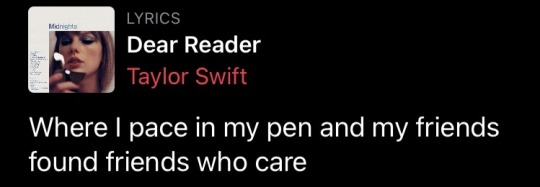
Now, let’s look at the lyric in between the two above. This is describing her feeling trapped in her own house. Here’s where Eras Tour visuals come in to align with this song.
‼️ Spoiler warning for eras tour visuals
Going “home” to Taylor has a specific meaning but so does a “house” because of the Lover House that represents her entire body of work so far. The Lover House is the house that Taylor built (or bought with the songs she wrote as she says in the Miss Americana documentary). It’s very significant that she is literally burning down the Lover House every single night at tour, and this lyric in Dear Reader gives more context to this visual.
In Dear Reader, the house is trapping her. Across all her work, Taylor has written over and over about cages and fences and boxes to evoke the feeling of being trapped. I find the use of the word “pen” here to be a very specific choice. "Pen” both means a physical pen locking something away as well as a writing instrument. She feels trapped inside this house that she built with her own writing.
I don’t think she resents her past work — but the narrative the public has created for her from it. Her early work is characterized by fairytale romances and idealizing the idea of marriage as a happy ending. And now, so many people keep expecting her to get married and have kids and retire so she can live out that narrative in real life. But as seen in other songs on Midnights like Lavender Haze, she’s decided that life isn’t for her.
So, she is burning down the Lover House, which represents the pen she feels trapped in, in order to be freed of the expectations the public has for her and have more control of her own public image and narrative.
Lavender Haze
The idea of feeling boxed in or trapped by societal roles and the public’s expectations is exemplified in Lavender Haze.
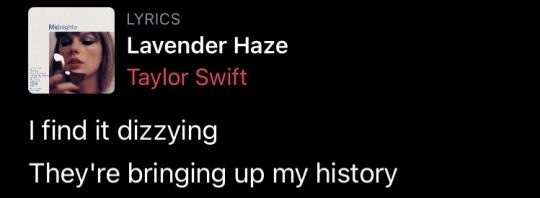
Her history is the Lover House and her career and the muses people assign to all of those songs. This is also her history of having written about an idealized version of marriage as a picture perfect happy ending. That is the standard to which a lot of the public is holding her to well over a decade later.

And now, she’s telling the public that she no longer wants that idea of marriage or that kind of happy ending. The lyric above is a critique of the entire societal standard that still categorizes women into two distinct boxes: either you’re the femme fatale temptress or the doting housewife. And she’d rather talk about anything else than whether or not she’ll get married.

She’s damned, or trapped, if she cares about the public’s expectations. She’ll be shoved into one of those two boxes: the temptress that can’t ever hold down a man or a doting housewife that’s expected to retire from her highly successful career in order to have children and that perfect happy ending.
And she especially does not want to be the housewife type figure. She directly says that doesn’t want that 1950s shit. It’s clear to me from this song that she wants to be successful in her career and just be herself without having all these expectations and gender roles forced upon her.
Lavender Haze is all about rejecting the traditional idea of marriage and charting her own path in life that’s outside of the public’s expectations. And the music video’s visuals support this, especially when the last shot is of her alone and seemingly happy without a lover.
This theme of rejecting the narrative that the public wants for her exists throughout Midnights because the album is about nights across her life, and her entire life has been shaped by her relationship with fame.
Midnight Rain
Obviously, the song that most directly echoes Lavender Haze in terms of rejecting the idea of marriage is Midnight Rain.
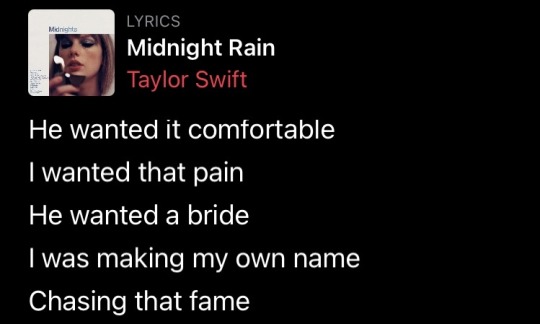
I don’t think Midnight Rain is about a recent time in her life, but she still chose to include a song about this on the album to further contribute to this theme of taking her narrative into her own hands. Midnight Rain positions Taylor as a complete opposite to the lover in the song — and by extension her career as opposite to that idealized fairytale happy ending type of romance.
Bejeweled
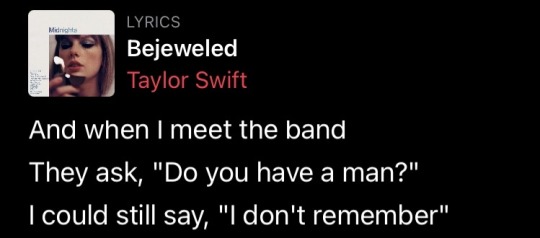
The entirety of Bejeweled sounds like it’s reflecting on a break up and getting back out there afterward. But for being in her single era, this one lyric stands out. And if you change the punctuation in “I don’t remember,” it can have two different meanings.
“I don’t remember” = whether or not she has a man is so unimportant she doesn’t remember for sure if she does or not
“I don’t, remember?” = I don’t have a man, why don’t you remember that?
The Bejeweled music video is also directly countering the fairytale happy ending romance. It’s a retelling of Cinderella where she ends up happy and alone. She literally turns down a proposal from the prince so that she can have her castle she won with her talent all to herself with her dragons/cats. That’s very single era to me.
You’re On Your Own, Kid
YOYOK is basically a pep talk she’s giving to her self about how she’s always been alone and how she can still be okay being alone. (cw: ed mention)
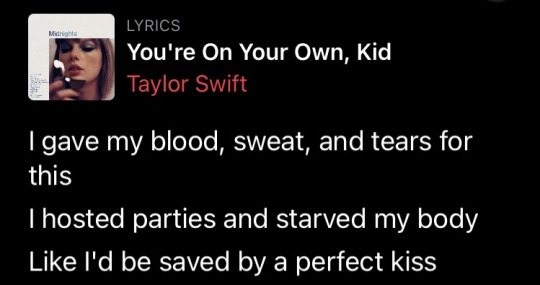
This specific lyric gets me because it’s once again a rejection of that idealized fairytale happy ending. Romance isn’t going to suddenly heal her like in the stories because real life isn’t a fairytale. Perfect magical kisses don’t exist.
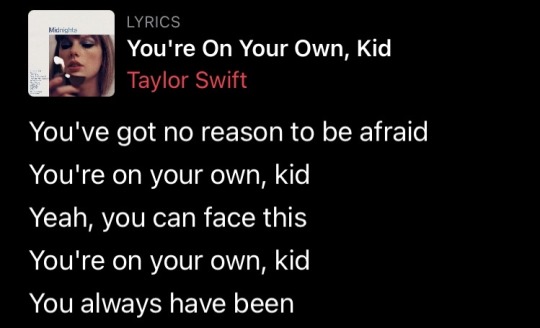
At the end of the song, she realizes she’s always been alone and that’s a source of comfort. She’s always had the tools to handle whatever life throws at her all on her own.
Taylor Swift is in her single era, and that’s okay!
I realize after writing all this out that it sounds like she’s sad in being single, but I don’t think she is. Every single one of these songs, aside from Dear Reader, has an upbeat note to it in the production and melody as well as some of the lyrics. Dear Reader can come back around to being upbeat with the Eras Tour visuals of her burning down the Lover House and being freed from everyone’s expectations.
Each and every piece of this is an example of her reclaiming her narrative for herself — and working to define her career not by any of her relationships or the public’s expectations, but by what she wants and her talent and her artistry. She wants to stand alone and proud on her own. That is definitely a happy thing.
#taylor swift lyric analysis#eras tour spoilers#cw: ed mention#taylor swift lyrics#taylor swift analysis#midnights#dear reader#lavender haze#lover house#taylor swift#bejewled music video#Taylor swift is a poet goddamnit#tswift motif: home#tswift motif: love is a game#I’m personally so ready for her single era
23 notes
·
View notes